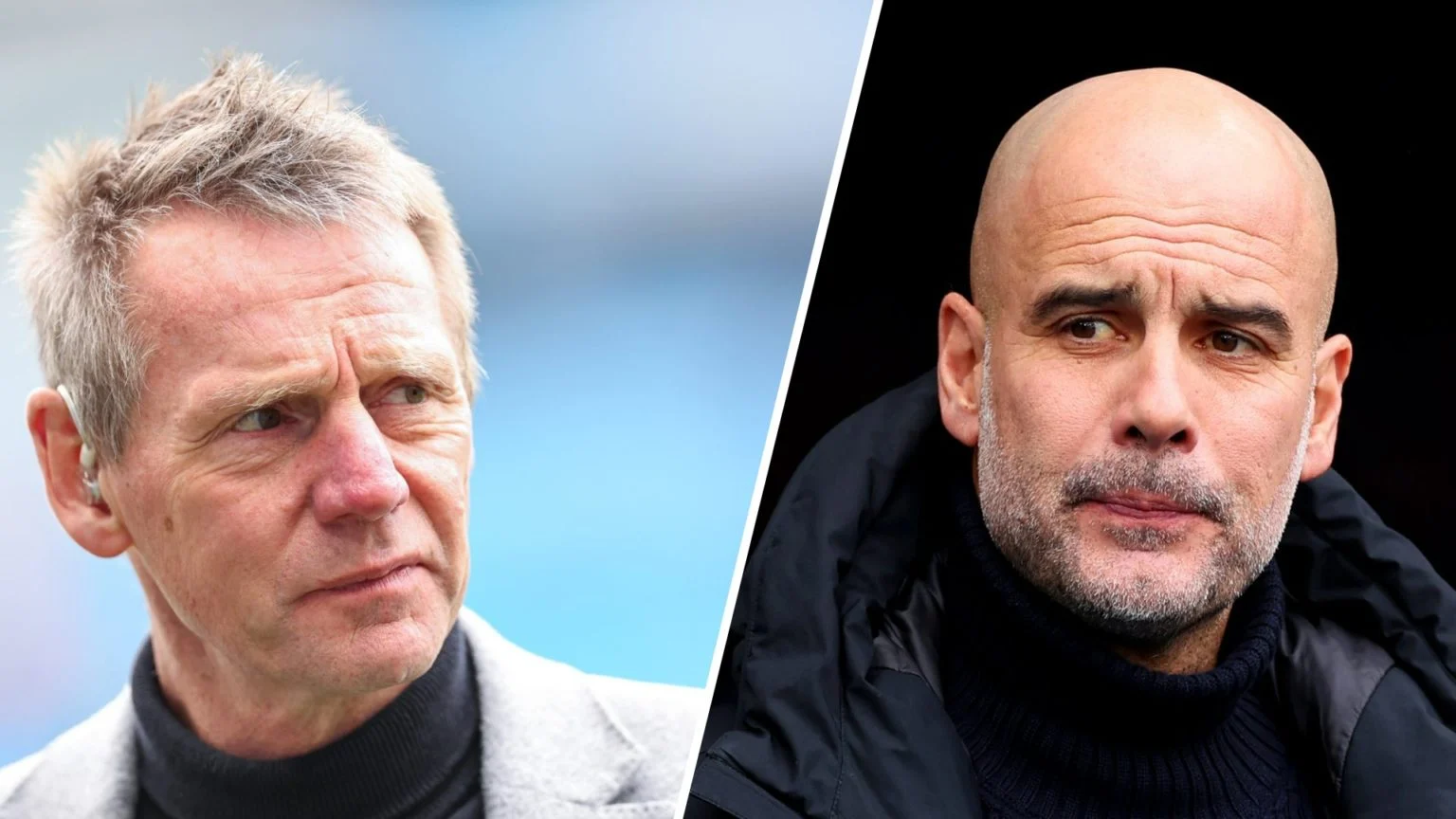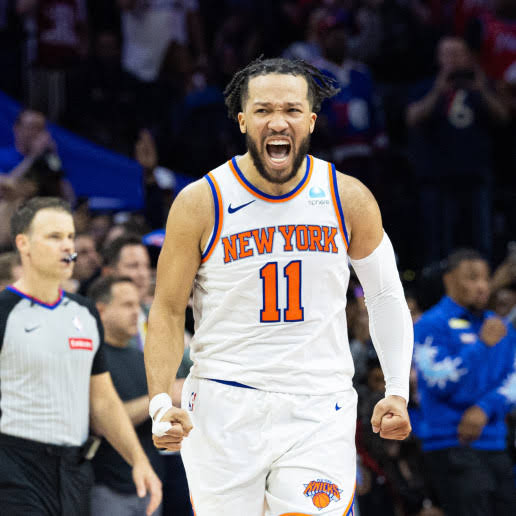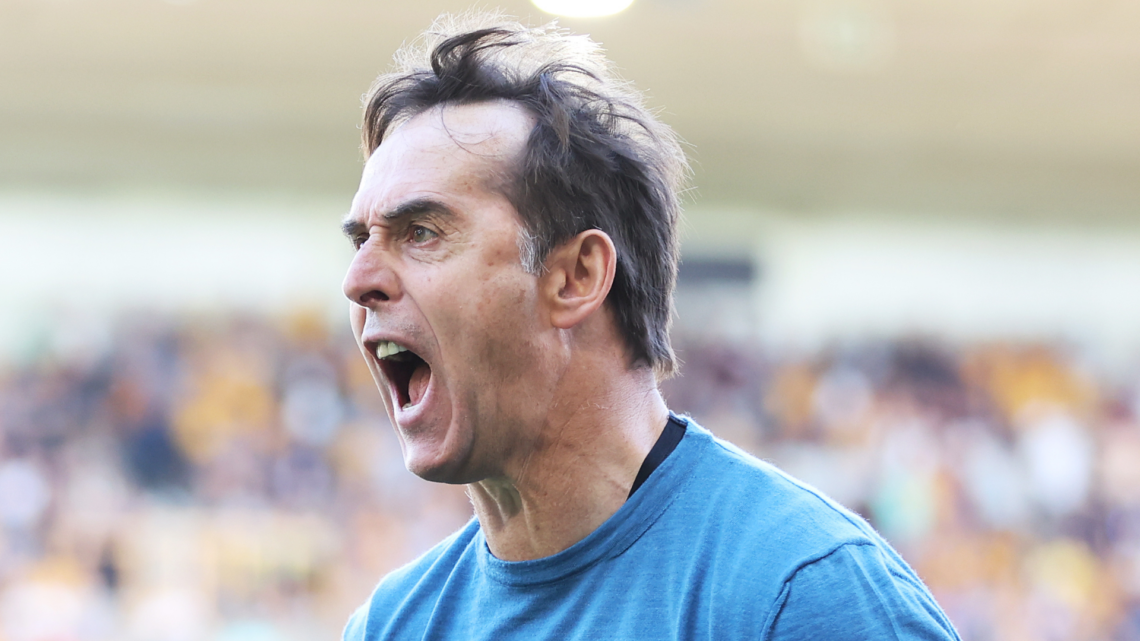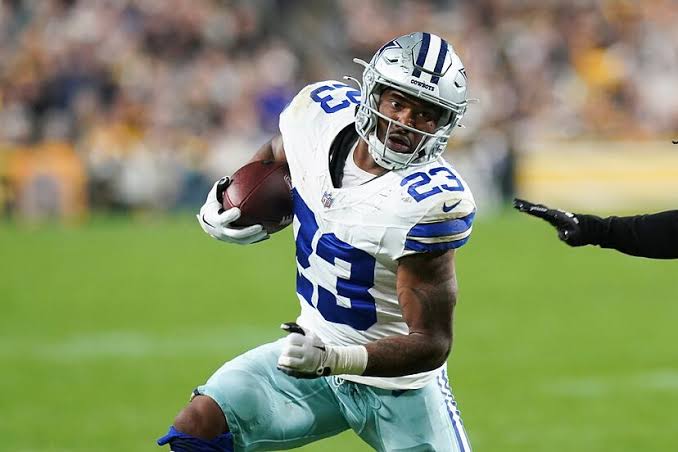As Manchester City prepare for their third consecutive FA Cup final appearance, the spotlight falls on Pep Guardiola’s team selection for the Wembley showdown against Crystal Palace. With City struggling to maintain their usual dominance this season, former Manchester City player and manager Stuart Pearce has made a compelling case that £59 million summer signing Omar Marmoush must start if the Citizens are to secure their third FA Cup trophy under Guardiola’s leadership.
“I think he’s been one of the standout players since he’s walked through the door, even when the team weren’t playing particularly well, he’s been one of the standout players and one of the successes,” Pearce emphasized during his appearance on talkSPORT. “So I would have to find a place in the starting lineup for him. I still feel Haaland will lead the line, but Marmoush, for me, has to play.”
This selection dilemma comes at a pivotal moment for Guardiola, who stands on the brink of history. Should City triumph on Saturday, the 54-year-old Catalan would join Sir Alex Ferguson as only the second manager to win both domestic English cups at least three times each—a remarkable testament to his enduring excellence in English football.
Marmoush’s Impact Since Arrival
The Egyptian international’s journey to the Etihad raised eyebrows when he arrived from Eintracht Frankfurt last summer. Many questioned whether the then 25-year-old could make the step up to Guardiola’s demanding system after his impressive but not extraordinary spell in the Bundesliga. What followed has been nothing short of revelatory.
Marmoush has emerged as one of City’s most consistent performers during a season that has seen the club struggle with injuries to key players and uncharacteristic inconsistency. His ability to operate effectively across the front line has provided Guardiola with tactical flexibility that has proven invaluable as the campaign progressed.
With 14 goals and 8 assists in all competitions this season, Marmoush has delivered crucial contributions at critical moments. His adaptation to the Premier League has been remarkably smooth, with his intelligent movement and technical proficiency aligning perfectly with Guardiola’s philosophy.
“What impresses me most about Marmoush is his game intelligence,” noted former City defender Micah Richards in his column last month. “He doesn’t just score goals or create chances; he understands space and how to manipulate defenders. That’s something you can’t teach, and it’s why he’s been such a perfect fit for Pep’s system.”
The Crystal Palace Challenge
Saturday’s final presents a fascinating tactical proposition. Crystal Palace under Oliver Glasner have evolved into a formidable unit, combining organized defense with explosive counter-attacking prowess. Their path to the final has included impressive victories over Everton, Wolves, and most notably, a stunning quarter-final triumph over Liverpool.
The encounter between these two sides last month provides compelling evidence for Marmoush’s inclusion. In a thrilling 5-2 victory for City, the Egyptian was instrumental, scoring the equalizer and causing Palace right-back Daniel Munoz consistent problems throughout the match.
Starting on the left wing, Marmoush exploited the space behind the attack-minded Colombian international with remarkable effectiveness. His partnership with young talent Nico O’Reilly overwhelmed Palace’s right flank, creating the overloads that Guardiola’s system thrives upon.
“What we saw in that game was Marmoush’s tactical discipline combined with his explosive pace,” explains tactical analyst Michael Cox. “Glasner has given Munoz significant freedom to join attacks, which leaves transitional spaces that Marmoush is perfectly suited to exploit. If Guardiola deploys him in the same role on Saturday, Palace will face the same dilemma—restrict Munoz’s forward runs or risk being exposed on the counter.”
The Selection Puzzle
The question of who starts behind Erling Haaland has been the subject of intense speculation. With Kevin De Bruyne’s fitness closely monitored and Phil Foden experiencing an inconsistent spell, Guardiola faces difficult decisions.
Troy Deeney recently suggested that De Bruyne might be surprisingly omitted from the starting XI, reflecting both tactical considerations and the Belgian’s carefully managed workload following injury concerns earlier in the season.
“I wouldn’t be surprised if Guardiola drops De Bruyne for the final,” Deeney said on Match of the Day. “It sounds crazy given his quality, but Pep has shown time and again that he’s willing to make bold calls for specific tactical reasons. The way Palace set up, he might feel a different profile of player gives them the edge.”
If De Bruyne does start, his connection with Marmoush could prove decisive. The Egyptian’s intelligent movement creates space for De Bruyne’s passing range to inflict maximum damage. In the five matches they’ve started together this season, City have scored an impressive 14 goals.
Guardiola offered a hint at his thinking by resting Marmoush for the final Premier League fixture against Southampton—a strong indication that the Egyptian features prominently in his plans for Wembley.
The Tactical Blueprint
The April encounter between these teams provides the tactical blueprint for City’s approach. Marmoush’s positioning on the left forced Crystal Palace into a significant defensive compromise. When Munoz advanced, Palace needed to adjust their defensive shape, typically by pulling a central midfielder wider to cover—creating space for City’s creative midfielders to exploit centrally.
“That’s where the domino effect begins,” explains former Palace manager Alan Pardew. “When you adjust to cover one problem, you create another. Marmoush forces that first domino to fall, and from there, City’s midfield rotation becomes almost impossible to track.”
This tactical vulnerability is precisely why Pearce’s assessment carries such weight. Marmoush doesn’t just offer individual quality; he unlocks structural advantages for City across the pitch.
“The way he pins defenders is remarkable,” adds Pearce. “He doesn’t always need the ball to be effective. His positioning and movement create space for others, which is exactly what Guardiola wants from his forward players.”
The Evolution of Marmoush
What makes Marmoush’s potential impact in the final even more intriguing is his continued evolution under Guardiola’s guidance. The Egyptian has spoken openly about the transformative effect of working with the Spanish coach.
“When I arrived, I thought I understood football,” Marmoush told City’s official website in March. “But working with Pep has opened my eyes to aspects of the game I never considered. The positioning, the timing of movements, recognizing triggers—these small details make the difference at this level.”
This development hasn’t gone unnoticed by his teammates either. Rodri, City’s midfield orchestrator, recently highlighted Marmoush’s rapid adaptation: “From day one, you could see his quality, but now you see his complete understanding of our system. He knows exactly when to come inside, when to stay wide, when to run behind. This makes him unpredictable for defenders and creates space for all of us.”
The statistics support this assessment. In the second half of the season, Marmoush’s key performance indicators have shown marked improvement: his successful pressing actions have increased by 18%, his progressive carries by 23%, and his touches in the opponent’s penalty area by 31%.
The Wembley Factor
Guardiola’s remarkable record at Wembley Stadium—13 wins from 20 appearances—suggests a coach who thrives on the grand occasion. His team selections for these showpiece events have often featured tactical surprises, but they’re always underpinned by clear strategic thinking.
The spacious Wembley pitch, measuring 105 meters by 68 meters, plays perfectly into City’s possession-based approach and, more specifically, into Marmoush’s strengths. The additional width and length compared to many Premier League grounds create more transitional spaces for his explosive acceleration and direct running.
“Wembley suits players like Marmoush,” observes former England international Joe Cole. “The extra space means more opportunities for him to isolate defenders in one-on-one situations. If Palace push too many men forward, those transitional moments become golden opportunities.”
The Palace Perspective
From Crystal Palace’s viewpoint, containing Marmoush presents a significant challenge. Glasner’s system has been built around Munoz’s attacking contributions from right-back, with the Colombian providing 11 assists in all competitions this season.
“Glasner faces a difficult decision,” suggests former Palace midfielder Darren Ambrose. “Does he instruct Munoz to be more conservative, potentially blunting one of their most effective attacking weapons? Or does he maintain their normal approach and risk being exposed by Marmoush’s pace and movement?”
The likely solution will involve midfielder Will Hughes providing additional cover when Munoz advances, but this adjustment creates its own problems. Hughes’ deeper positioning would reduce Palace’s central pressing capability, potentially giving City’s midfielders more time on the ball—a dangerous proposition given their technical quality.
“It’s a chess match,” Ambrose continues. “Glasner knows the threat Marmoush poses, but adapting too much to counter him might disrupt Palace’s own system. Finding that balance will be crucial to their chances.”
The Historical Context
Saturday’s final carries additional significance for City in their pursuit of a historic achievement. Having dominated the Premier League for much of the past decade, the FA Cup represents an opportunity to further cement their legacy during the Guardiola era.
For Marmoush personally, the final offers a chance to write his name into both City and Egyptian football history. Should he play a decisive role in securing the trophy, he would join Mohamed Salah and Mohamed Elneny as the only Egyptian players to win the FA Cup.
The Egyptian connection adds another fascinating dimension to Marmoush’s potential impact. His rise to prominence at City has been closely followed in his homeland, creating a new generation of City supporters across North Africa.
“He’s become an inspiration,” notes Egyptian football journalist Hassan Elassal. “Young players in Egypt see Marmoush succeeding at one of the world’s biggest clubs under one of the greatest managers. His journey from El Mokawloon to the FA Cup final at Wembley represents everything that’s possible in football.”
The Supporting Cast
While Marmoush’s inclusion seems increasingly likely, the players around him will determine how effective he can be. With Haaland certain to lead the line, the configuration of the supporting attacking players remains uncertain.
Phil Foden, Jeremy Doku, Jack Grealish, and Bernardo Silva all offer different qualities that could complement Marmoush’s attributes. Foden’s technical brilliance, Doku’s direct dribbling, Grealish’s close control, or Silva’s intelligent movement—each presents a different tactical proposition.
The most intriguing option might be the inclusion of young talent Nico O’Reilly alongside Marmoush. Their partnership showed promising signs against Palace in April, with O’Reilly’s intelligence and technical ability creating space for Marmoush to exploit.
“The O’Reilly-Marmoush connection could be something special,” predicts City legend Shaun Wright-Phillips. “They seem to have a natural understanding, and at Wembley, that kind of intuitive relationship can be decisive.”
The Final Verdict
As Saturday approaches, the case for Marmoush’s inclusion grows stronger. His specific skill set offers the perfect counter to Palace’s tactical approach, his form has been consistently impressive, and his rest during the Southampton fixture suggests Guardiola has him firmly in mind for Wembley.
“Some players are simply made for certain occasions,” concludes Pearce. “Everything about Marmoush’s game—his technical quality, his tactical intelligence, his physical attributes—aligns perfectly with what City will need against Palace. For me, it’s not even a question—he has to start.”
Guardiola, who has made a career of making the right decisions at crucial moments, will understand the compelling logic behind Pearce’s assessment. In a season where City have struggled to maintain their usual dominance, Marmoush has emerged as one of their most consistent performers and most dangerous attacking threats.
As the teams walk out at Wembley on Saturday afternoon, all eyes will be on City’s team sheet. If Marmoush’s name features in the starting XI, it will represent not just recognition of his outstanding first season at the Etihad but also Guardiola’s tactical astuteness in identifying the perfect weapon to secure a historic third FA Cup triumph.
In a final that promises tactical intrigue, moments of individual brilliance, and the drama that defines English football’s most storied competition, Omar Marmoush could well be the difference-maker that secures the trophy for Manchester City. As Pearce emphatically stated: “Marmoush, for me, has to play.”
The Bigger Picture
Beyond Saturday’s final, Marmoush’s impact at City raises interesting questions about the club’s future direction. With Guardiola entering the final year of his current contract and speculation about his long-term plans, the Egyptian’s emergence offers evidence that the manager remains committed to evolving his squad.
The £59 million investment in Marmoush represented a significant outlay for a player who wasn’t a household name outside of Bundesliga circles. That Guardiola identified him as the ideal profile to complement his attacking options speaks volumes about both the manager’s eye for talent and the club’s commitment to his vision.
“What we’re seeing with signings like Marmoush is Guardiola building for the future while maintaining the present,” suggests football finance expert Kieran Maguire. “These aren’t just players for the here and now; they’re investments in sustaining City’s success beyond Guardiola’s tenure.”
For Palace, neutralizing Marmoush represents their most significant tactical challenge. Stop him, and they potentially disrupt City’s entire attacking structure. Allow him the freedom he exploited in April, and a first FA Cup triumph for the Eagles since their 1990 final appearance seems unlikely.
As both teams complete their final preparations, the focus inevitably returns to Guardiola’s selection decision. History suggests he will make the right call, and all evidence points to Omar Marmoush starting at Wembley on Saturday. Should that be the case, Stuart Pearce’s assessment could prove prophetic: the Egyptian may well be the key that unlocks FA Cup glory for Manchester City once again.



